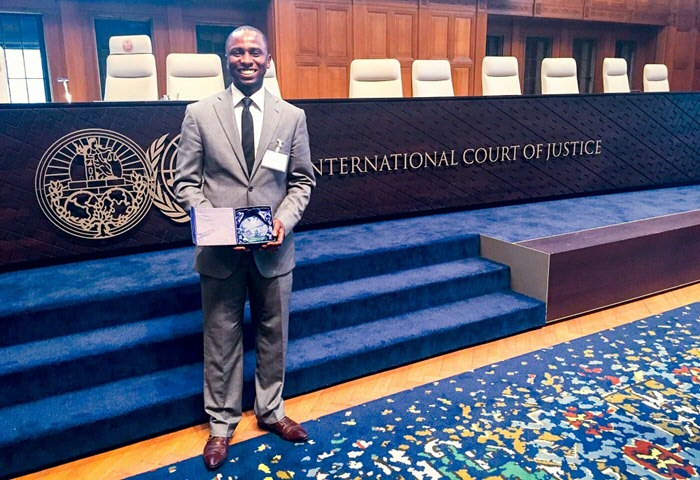Faculty of Law LLM student Allan Mukuki one of top speakers at Telders International Law Moot Court Competition
Of the over 100 speakers participating at this year’s Telders International Law Moot Court Competition in The Hague, University of Groningen LLM student Allan Mukuki was awarded the honour of Runner-Up Best Oralist, being only beaten by a mere 0.06 by the top speaker. Mukuki, originally from Kenya, is currently studying in the LLM programme in Public International Law here in Groningen.
Regarding his recognition, he notes, “A few years ago, all I could dream was coming back into the ICJ, not as a tourist as I did in 2012, but as something more. Well, in 2016, what was just a dream in 2012 was now a reality in the hallowed halls of international justice in 2016.”
The other members of the University of Groningen team participating at the Telders also performed exceptionally, with both placing among the top 25 oralists; Mirjam Mulderij (LLM International & European Law) placed 15th and Nika Melkadze (LLM Public International Law) placing 23rd.
The Telders competition was held from May 18th – 21st at the International Court of Justice in The Hague, with 27 teams from 24 countries competing to win the most prestigious and important moot court competition in Europe. The University of Groningen team placed 6th overall.

| Last modified: | 19 January 2024 08.41 a.m. |
More news
-
22 April 2025
Impact | Online advice about right to freedom of assembly
In the coming weeks the nominees for the Ben Feringa Impact Award 2025 will introduce themselves and their impactful research or project. This week: Noor Swart and Berend Roorda, on their online information initiative on the right of freedom to...
-
22 April 2025
How do you shield yourself from Big Tech's power?
How can we all become less dependent on Big Tech? A topical and urgent question that is also arising within the University. Recently, a petition by a group of staff members made the rounds that called for the University to break away from Google and...
-
15 April 2025
The Faculty of Law launches podcast The Right to News
On 16 April 2025, the Faculty of Law at the University of Groningen will launch the first episode of its podcast The Right to News (in Dutch: Recht op Nieuws). The theme of the first episode is: “Can the government just ban organizations in the...
